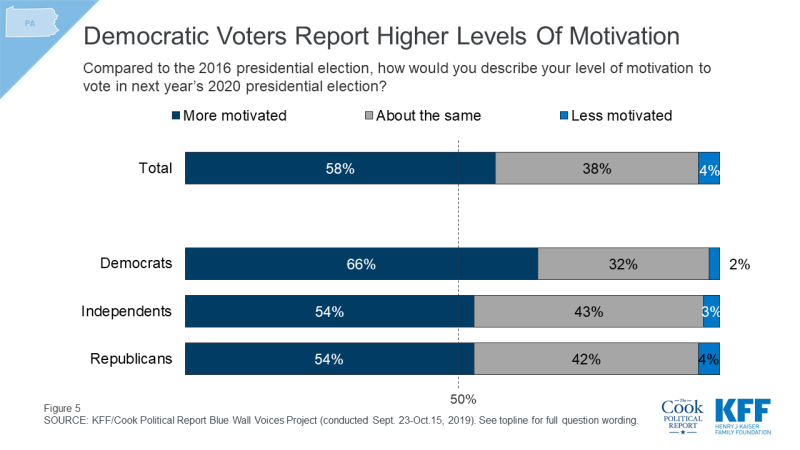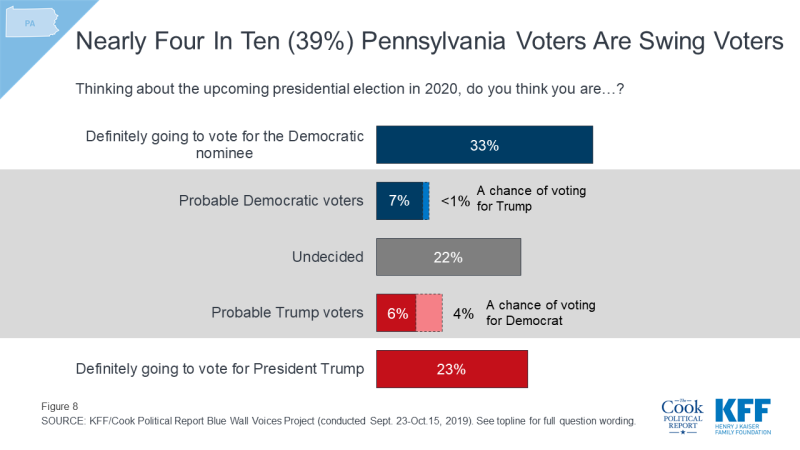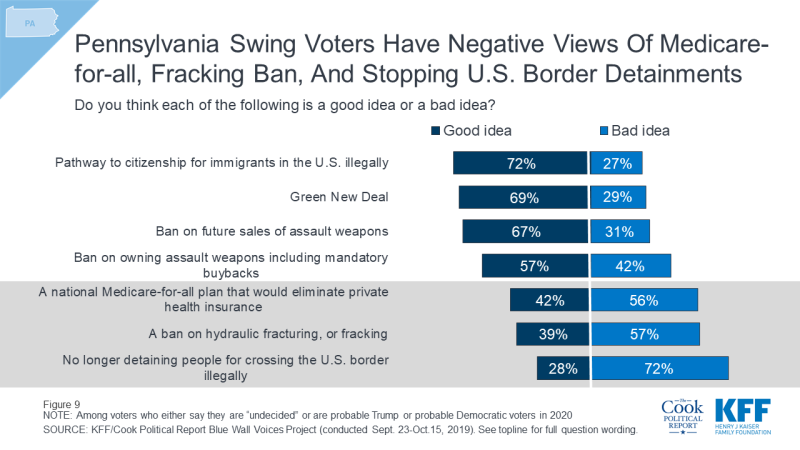Blue Wall Voices Project
Pennsylvania
The Blue Wall Voices Project examines voters in Pennsylvania, a state that President Trump won by less than one percentage point (approximately 44,000 votes) over Democratic candidate Hillary Clinton in 2016. This poll finds that health care is among the top issues for voters more than one year out from the general election and examines enthusiasm and vote choice leading up to the 2020 presidential election.
Health care ranks among the top issues for voters leading up to the 2020 presidential election along with the economy, gun policy, and climate change. Health care is the top issue for Democratic voters (28%) and ranks among the top issue for independent voters (25%), but ranks lower among Republican voters. In fact, among Republican voters, health care ranks below the economy (31%), gun policy (16%), and immigration (14%), and alongside foreign policy or national security (9%) and taxes (9%), with one in ten Republican voters saying health care will be the most important issue in deciding their vote next year.
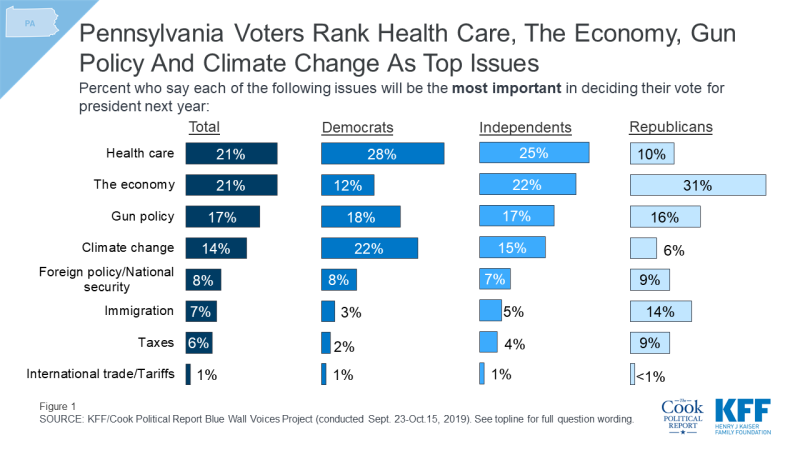
Figure 1: Pennsylvania Voters Rank Health Care, The Economy, Gun Policy And Climate Change As Top Issues
Similar to the overall Blue Wall, Pennsylvania voters are most positive in their views of the way President Trump has handled the economy with nearly half (48%) of Pennsylvania voters saying they approve of his job performance on this issue. On the other hand, more than six in ten Pennsylvania voters (63%) say they disapprove of the way he has handled health care. Both of these issues appear to be key issues leading up to the 2020 presidential race.
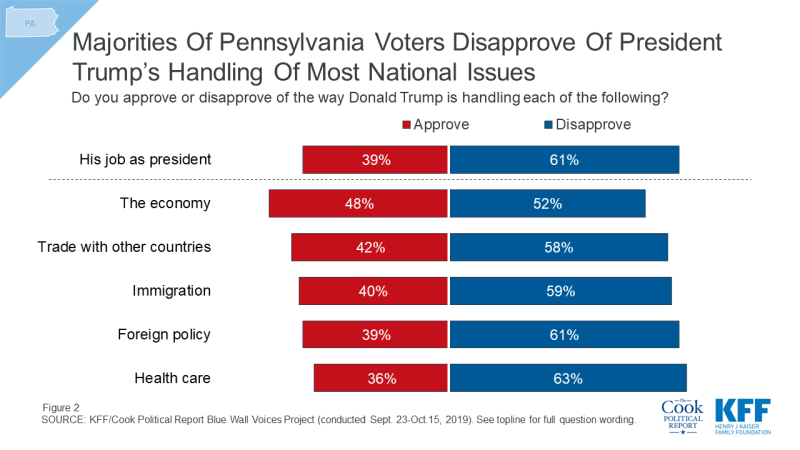
Figure 2: Majorities Of Pennsylvania Voters Disapprove Of President Trump’s Handling Of Most National Issues
Pennsylvania Voters on Health Care
While Medicare-for-all has dominated most of the health care discussions on the 2020 Democratic campaign trail, it ranks low among the priorities that the public has for Congress next year. One-fourth (26%) of Pennsylvania voters say implementing a national Medicare-for-all plan is a “top priority” for Congress compared to nearly seven in ten who say the same about lowering prescription drug costs for as many Americans as possible (68%) as well as maintaining the Affordable Care Act’s protections for people with pre-existing medical conditions (68%). Implementing a national Medicare-for-all plan is not even a top priority among Democratic voters (36%).
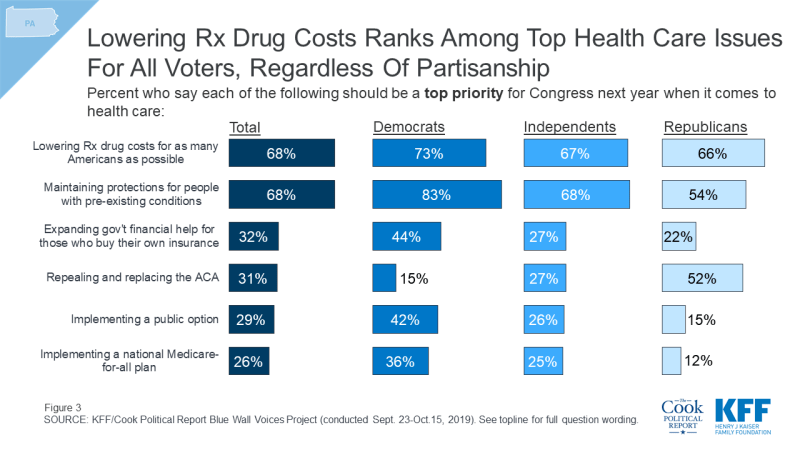
Figure 3: Lowering Rx Drug Costs Ranks Among Top Health Care Issues For All Voters, Regardless Of Partisanship
The Economy
The economy is another top issue for Pennsylvania voters but views of how the economy will fare over the next 12 months are largely driven by partisanship. Overall, voters in Pennsylvania are divided with similar shares saying they think that the U.S. will experience “good times” (47%) and “bad times” (51%) over the next 12 months. Eight in ten (78%) Democratic voters say the U.S. will have bad times financially over the next year while 80% of Republicans say the U.S. will have good times. Independents are evenly divided (49% v. 49%).
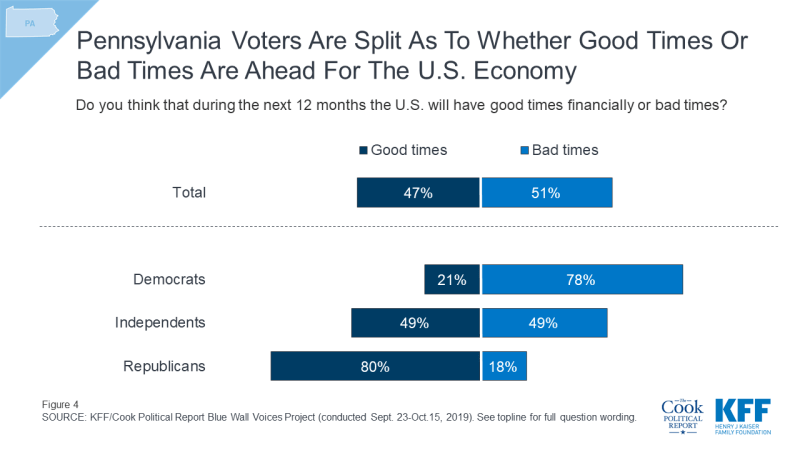
Figure 4: Pennsylvania Voters Are Split As To Whether Good Times Or Bad Times Are Ahead For The U.S. Economy
The Democratic Primary in Pennsylvania and Preview of the General Election
Two-thirds of Democratic voters say they are more motivated to vote in next year’s 2020 presidential election than they were in 2016 compared to slightly more than half of independent voters (54%) and Republican voters (54%). This is similar to the overall Blue Wall findings, which finds the Democratic Party has a slight enthusiasm edge over their Republican counterparts.
When asked to say in their own words what will be the one thing that will motivate them to vote in the 2020 presidential election, a larger share of voters offer responses related to defeating President Trump than any other thing. One-fifth of voters say defeating President Trump (22%) is the one thing that will motivate them to vote next year, followed by those who say they are motivated by re-electing President Trump or not wanting to elect a Democrat (10%), the issue of health care (8%), or their civic duty (7%).
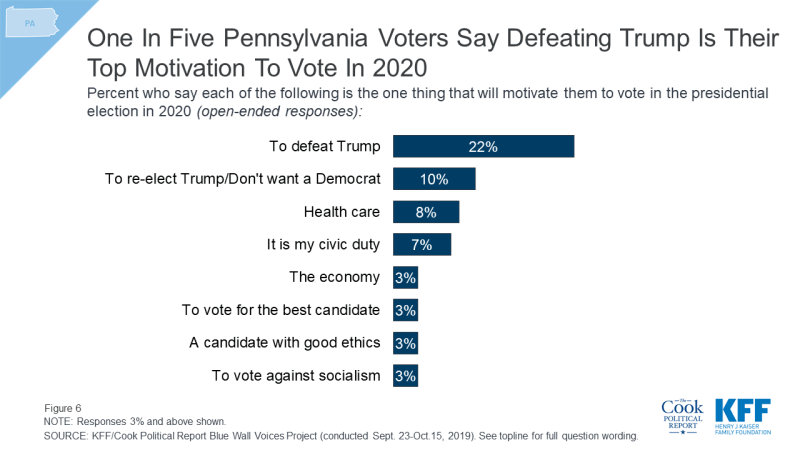
Figure 6: One In Five Pennsylvania Voters Say Defeating Trump Is Their Top Motivation To Vote In 2020
With more than six months before the Pennsylvania Democratic primary, Vice President Joe Biden, a Pennsylvania native, is the first choice among Democratic primary voters. One-fourth (27%) of Democratic primary voters chose Vice President Biden as their first choice of 2020 Democratic candidates followed by 18% of Democratic primary voters who chose Senator Elizabeth Warren and 14% who chose Senator Bernie Sanders. Senator Warren and Vice President Biden have a relatively similar share of first choice and second choice votes with more than one-third of voters selecting either candidate as their first or second choice.
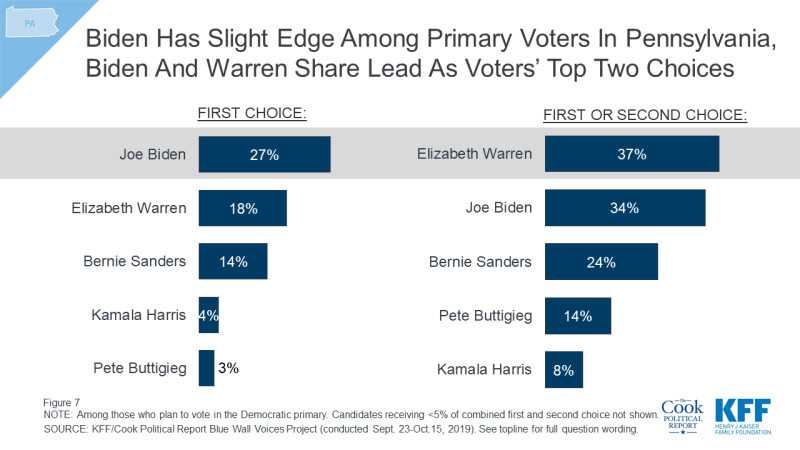
Figure 7: Biden Has Slight Edge Among Primary Voters In Pennsylvania, Biden And Warren Share Lead As Voters’ Top Two Choices
Nearly four in ten (39%) Pennsylvania voters are still either undecided (22%) about their 2020 vote choice, or say they are “probably” voting for either President Trump (10%) or the Democratic nominee (7%) but have not made up their minds yet. This is compared to one-third of voters who say they are “definitely voting” for the Democratic nominee and one-fourth who are “definitely voting” for President Trump (23%).
With four in ten Pennsylvania votes still up for grabs, the poll finds that majorities of Pennsylvania swing voters (those who either say are still undecided or are either probable but not definite Trump or Democratic voters) say many of the progressive platforms currently being discussed in the Democratic primary are good ideas, but these voters are less positive in their views of three important policy positions, including Medicare-for-all. More than half of Pennsylvania swing voters say a pathway to citizenship for immigrants in the country illegally (72%), the Green New Deal (69%), a ban on future sales of assault weapons (67%), and a ban on owning assault weapons (57%) are good ideas. On the other hand, Pennsylvania swing voters are more negative in views of a national Medicare-for-all plan, fracking, and no longer detaining people for crossing the U.S. border illegally. Majorities of Pennsylvania swing voters say all three of these progressive platforms, a national Medicare-for-all plan (56%), a ban on fracking (57%), and stopping U.S. border detainments (72%), are “bad ideas.”

